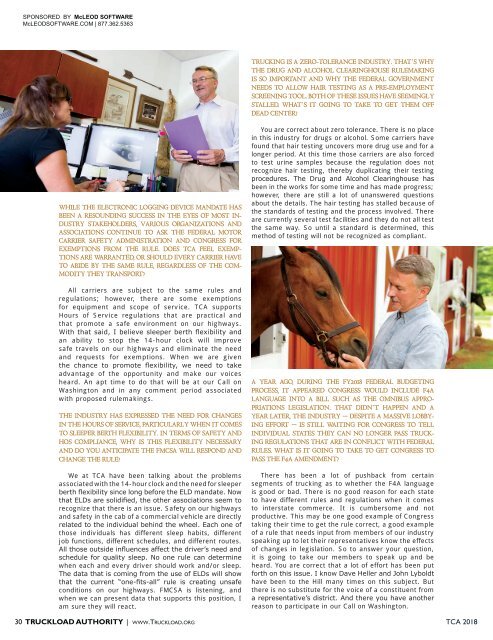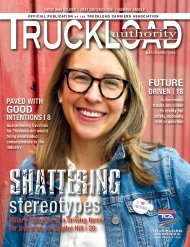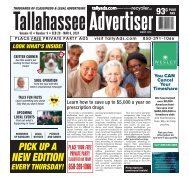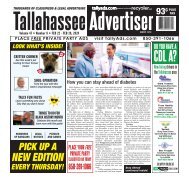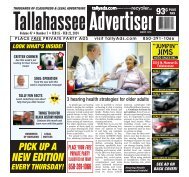Truckload Authority - August/September 2018
Create successful ePaper yourself
Turn your PDF publications into a flip-book with our unique Google optimized e-Paper software.
Sponsored by Mcleod software<br />
McLeodSoftware.com | 877.362.5363<br />
Trucking is a zero-tolerance industry. That’s why<br />
the Drug and Alcohol Clearinghouse rulemaking<br />
is so important and why the federal government<br />
needs to allow hair testing as a pre-employment<br />
screening tool. Both of these issues have seemingly<br />
stalled. What’s it going to take to get them off<br />
dead center?<br />
While the electronic logging device mandate has<br />
been a resounding success in the eyes of most industry<br />
stakeholders, various organizations and<br />
associations continue to ask the Federal Motor<br />
Carrier Safety Administration and Congress for<br />
exemptions from the rule. Does TCA feel exemptions<br />
are warranted, or should every carrier have<br />
to abide by the same rule, regardless of the commodity<br />
they transport?<br />
All carriers are subject to the same rules and<br />
regulations; however, there are some exemptions<br />
for equipment and scope of service. TCA supports<br />
Hours of Service regulations that are practical and<br />
that promote a safe environment on our highways.<br />
With that said, I believe sleeper berth flexibility and<br />
an ability to stop the 14-hour clock will improve<br />
safe travels on our highways and eliminate the need<br />
and requests for exemptions. When we are given<br />
the chance to promote flexibility, we need to take<br />
advantage of the opportunity and make our voices<br />
heard. An apt time to do that will be at our Call on<br />
Washington and in any comment period associated<br />
with proposed rulemakings.<br />
The industry has expressed the need for changes<br />
in the Hours of Service, particularly when it comes<br />
to sleeper berth flexibility. In terms of safety and<br />
HOS compliance, why is this flexibility necessary<br />
and do you anticipate the FMCSA will respond and<br />
change the rule?<br />
We at TCA have been talking about the problems<br />
associated with the 14-hour clock and the need for sleeper<br />
berth flexibility since long before the ELD mandate. Now<br />
that ELDs are solidified, the other associations seem to<br />
recognize that there is an issue. Safety on our highways<br />
and safety in the cab of a commercial vehicle are directly<br />
related to the individual behind the wheel. Each one of<br />
those individuals has different sleep habits, different<br />
job functions, different schedules, and different routes.<br />
All those outside influences affect the driver’s need and<br />
schedule for quality sleep. No one rule can determine<br />
when each and every driver should work and/or sleep.<br />
The data that is coming from the use of ELDs will show<br />
that the current “one-fits-all” rule is creating unsafe<br />
conditions on our highways. FMCSA is listening, and<br />
when we can present data that supports this position, I<br />
am sure they will react.<br />
You are correct about zero tolerance. There is no place<br />
in this industry for drugs or alcohol. Some carriers have<br />
found that hair testing uncovers more drug use and for a<br />
longer period. At this time those carriers are also forced<br />
to test urine samples because the regulation does not<br />
recognize hair testing, thereby duplicating their testing<br />
procedures. The Drug and Alcohol Clearinghouse has<br />
been in the works for some time and has made progress;<br />
however, there are still a lot of unanswered questions<br />
about the details. The hair testing has stalled because of<br />
the standards of testing and the process involved. There<br />
are currently several test facilities and they do not all test<br />
the same way. So until a standard is determined, this<br />
method of testing will not be recognized as compliant.<br />
A year ago, during the FY<strong>2018</strong> federal budgeting<br />
process, it appeared Congress would include F4A<br />
language into a bill such as the omnibus appropriations<br />
legislation. That didn’t happen and a<br />
year later, the industry — despite a massive lobbying<br />
effort — is still waiting for Congress to tell<br />
individual states they can no longer pass trucking<br />
regulations that are in conflict with federal<br />
rules. What is it going to take to get Congress to<br />
pass the F4A amendment?<br />
There has been a lot of pushback from certain<br />
segments of trucking as to whether the F4A language<br />
is good or bad. There is no good reason for each state<br />
to have different rules and regulations when it comes<br />
to interstate commerce. It is cumbersome and not<br />
productive. This may be one good example of Congress<br />
taking their time to get the rule correct, a good example<br />
of a rule that needs input from members of our industry<br />
speaking up to let their representatives know the effects<br />
of changes in legislation. So to answer your question,<br />
it is going to take our members to speak up and be<br />
heard. You are correct that a lot of effort has been put<br />
forth on this issue. I know Dave Heller and John Lyboldt<br />
have been to the Hill many times on this subject. But<br />
there is no substitute for the voice of a constituent from<br />
a representative’s district. And there you have another<br />
reason to participate in our Call on Washington.<br />
30 <strong>Truckload</strong> <strong>Authority</strong> | www.<strong>Truckload</strong>.org TCA <strong>2018</strong>


